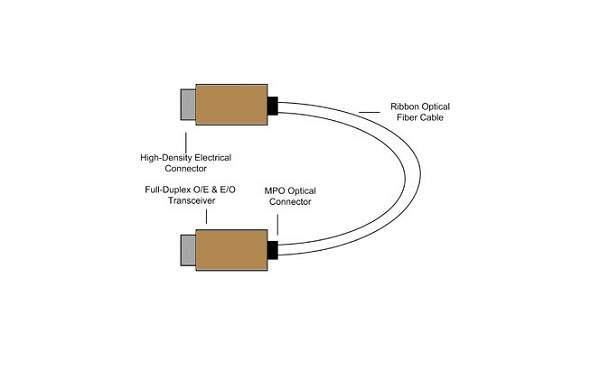



Why is the demand for AOC generated? Since the electromagnetic interference of the passive optical cable limits the performance and reliability of the DAC, the AOC has incomparable advantages with the DAC in the data transmission environment, including small size, light weight, strong bending performance, easy management, and longer transmission distance. These features meet the high density requirements of data centers. Many projects seek fast communication methods, so active fiber optic cable is one of the best solutions to solve this problem.
What is an active optical cable?
An active optical cable is composed of a multimode optical fiber, an optical transceiver device, a control chip, and a parallel optical module. The structure of the AOC component is as shown in Figure 1-1. The optical transceivers at both ends of the AOC provide photoelectric conversion and optical transmission functions to increase the transmission speed and transmission distance of the optical cable. Its biggest highlight is that it does not weaken compatibility with standard electrical interfaces. It is mainly used in short-range multi-channel data communication applications.

What is the difference between AOC and ordinary pluggable optical modules and DACs?
AOC does not have the problem of cleaning the fiber optic connector, and the closed ends are more susceptible to environmental and vibration swings. If a fault occurs, it can be replaced directly, without the need to do a series of termination plug-and-pull tests of the SR4 optical module and the MPO jumper on site, saving costs. The disadvantage is that the distance cannot be flexibly configured, and the transmission distance needs to be confirmed in advance before leaving the factory. There is not much difference between the two on OM3 fiber. However, the performance of the SR4 optical module is easier to control. If a longer distance (>300 m) is to be transmitted, SR4 is recommended.
In general, most optical communication wired transmissions are passive optical cables that provide direct transmission between corresponding optical cables. Active fiber optic cable can achieve the same effect. It overcomes some of the drawbacks of passive fiber optic cables by embedding optical or electronic components within the connector. AOC has the advantages of small cable diameter, favorable air circulation, easier system cooling and lower power consumption, and no need for high power consumption of the motherboard Host.